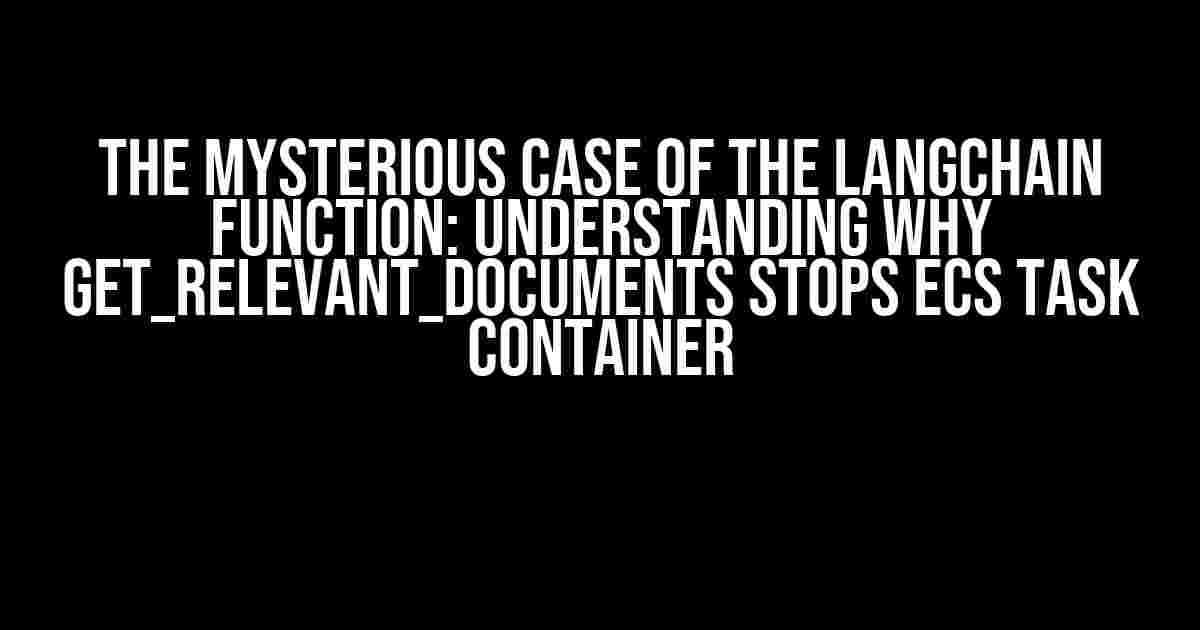Are you tired of dealing with the frustration of the Langchain function’s get_relevant_documents feature bringing your ECS Task Container to a screeching halt? You’re not alone! In this comprehensive guide, we’ll delve into the heart of the issue, explore the reasons behind this malfunction, and provide you with actionable solutions to get your container up and running smoothly.
What is Langchain and Why is it Important?
Langchain is a powerful natural language processing (NLP) tool that enables developers to build intelligent applications capable of understanding and generating human-like language. Its get_relevant_documents function is a crucial component that retrieves relevant documents based on a given input, making it an essential feature for many applications.
The Problem: get_relevant_documents Stops ECS Task Container
However, many developers have reported that the get_relevant_documents function can cause their ECS Task Container to stop unexpectedly, leading to downtime and lost productivity. But why does this happen?
The root cause of this issue lies in the way Langchain handles document retrieval. When the get_relevant_documents function is called, it initiates a complex process involving multiple components, including language models, indexing, and ranking algorithms. If any of these components fail or time out, the entire function can come to a grinding halt, taking the ECS Task Container with it.
Identifying the Culprits: Common Causes of the Issue
Before we dive into the solutions, let’s examine some of the most common causes of the get_relevant_documents function stopping the ECS Task Container:
- Resource Constraints: Insufficient memory, CPU, or disk space can cause the function to fail, especially when dealing with large document sets.
- Timeouts: If the function takes too long to execute, it can time out, leading to container stoppage.
- Network Connectivity Issues: Poor network connectivity or firewalls can prevent the function from retrieving documents, causing the container to fail.
- Incorrect Configuration: Misconfigured Langchain settings or ECS Task Container parameters can lead to function failure.
- Document Corruption: Corrupted or malformed documents can cause the function to fail, leading to container stoppage.
Troubleshooting and Solutions
Now that we’ve identified the possible causes, let’s explore some troubleshooting steps and solutions to get your ECS Task Container up and running:
1. Resource Optimization
Ensure that your ECS Task Container has sufficient resources to handle the load. This can be achieved by:
- Increasing the container’s memory and CPU allocations.
- Optimizing the language model and indexing algorithms for better performance.
- Implementing caching mechanisms to reduce the load on the function.
// Example: Increase container memory allocation
aws ecs update-container-instances --container-instances arn:aws:ecs:REGION:ACCOUNT_ID:container-instance/CONTAINER_INSTANCE_ID --capacity-providers FARGATE --enable-execute-command=true --memory 4096
2. Timeout Tuning
Adjust the timeout settings for the get_relevant_documents function to ensure it has sufficient time to execute:
- Increase the function’s timeout value in the Langchain configuration.
- Implement a retry mechanism to handle temporary failures.
// Example: Increase function timeout in Langchain configuration
langchain:
timeout: 300s
3. Network Connectivity and Firewalls
Verify that your network connectivity and firewalls are not blocking the function’s requests:
- Check firewall rules to ensure that the necessary ports are open.
- Verify that the container has access to the required network resources.
// Example: Open necessary ports in security group
aws ec2 authorize-security-group-ingress --group-id sg-0123456789abcdef0 --protocol tcp --port 8080 --cidr-ip 0.0.0.0/0
4. Configuration and Document Validation
Validate your Langchain configuration and ensure that documents are correctly formatted:
- Verify that the Langchain configuration is correct and up-to-date.
- Validate document formats and structures to ensure they can be processed correctly.
// Example: Validate Langchain configuration
langchain validate-config
Best Practices for Avoiding Future Issues
To avoid future occurrences of the get_relevant_documents function stopping your ECS Task Container, follow these best practices:
- Monitor Resource Utilization: Keep a close eye on container resource utilization to catch potential issues before they escalate.
- Implement Error Handling: Develop robust error handling mechanisms to capture and respond to function failures.
- Regularly Update Langchain: Ensure that your Langchain installation is up-to-date with the latest bug fixes and performance enhancements.
- Test Thoroughly: Thoroughly test your application and Langchain configuration to identify potential issues before deployment.
- Document and Knowledge Share: Maintain detailed documentation of your Langchain configuration, ECS Task Container setup, and troubleshooting steps to facilitate knowledge sharing and collaboration within your team.
| Best Practice | Description |
|---|---|
| Monitor Resource Utilization | Track container resource usage to identify potential issues. |
| Implement Error Handling | Develop robust error handling mechanisms to capture and respond to function failures. |
| Regularly Update Langchain | Ensure that your Langchain installation is up-to-date with the latest bug fixes and performance enhancements. |
| Test Thoroughly | Thoroughly test your application and Langchain configuration to identify potential issues before deployment. |
| Document and Knowledge Share | Maintain detailed documentation of your Langchain configuration, ECS Task Container setup, and troubleshooting steps. |
Conclusion
In conclusion, the Langchain function’s get_relevant_documents feature stopping the ECS Task Container is a complex issue with multiple causes and solutions. By understanding the root causes, identifying the culprits, and implementing the troubleshooting steps and best practices outlined in this guide, you’ll be well-equipped to overcome this challenge and ensure your application’s stability and performance.
Remember, staying proactive, monitoring resource utilization, and testing thoroughly are key to avoiding future issues. With the right approach and mindset, you can unlock the full potential of Langchain and ECS Task Containers, and build powerful, intelligent applications that transform your business.
Frequently Asked Question
Get the scoop on the Langchain function get_relevant_documents and its impact on ECS Task Containers!
Why does the Langchain function get_relevant_documents cause ECS Task Containers to stop?
The Langchain function get_relevant_documents can cause ECS Task Containers to stop due to excessive memory usage. When the function is called, itRetrieve a large number of documents from the index, which can consume a significant amount of memory. If the container’s memory limit is exceeded, the task will be terminated, leading to container failure.
How can I avoid ECS Task Containers from stopping due to the get_relevant_documents function?
To avoid container failure, you can implement pagination or limit the number of documents retrieved by the get_relevant_documents function. This will reduce memory usage and prevent the container from exceeding its memory limit. Additionally, consider increasing the memory limit of the container or optimizing the indexing process to reduce the number of documents retrieved.
Can I configure the get_relevant_documents function to avoid ECS Task Container failures?
Yes, you can configure the get_relevant_documents function to avoid container failures. You can adjust the function’s parameters, such as the batch size or timeout, to reduce the load on the container. Additionally, you can use caching mechanisms or optimize the indexing process to reduce the number of documents retrieved.
What are the consequences of ECS Task Containers stopping due to the get_relevant_documents function?
If ECS Task Containers stop due to the get_relevant_documents function, it can lead to service disruptions, data loss, and increased latency. Additionally, container failures can trigger alarm and notification systems, causing unnecessary alerts and distractions. To avoid these consequences, it’s essential to implement measures to prevent container failures.
How can I monitor ECS Task Containers for get_relevant_documents function-related issues?
You can monitor ECS Task Containers for get_relevant_documents function-related issues by tracking container performance metrics, such as memory usage, CPU utilization, and task failures. Use tools like CloudWatch, Prometheus, or Grafana to visualize and analyze container performance data. This will help you identify potential issues before they cause container failures.


